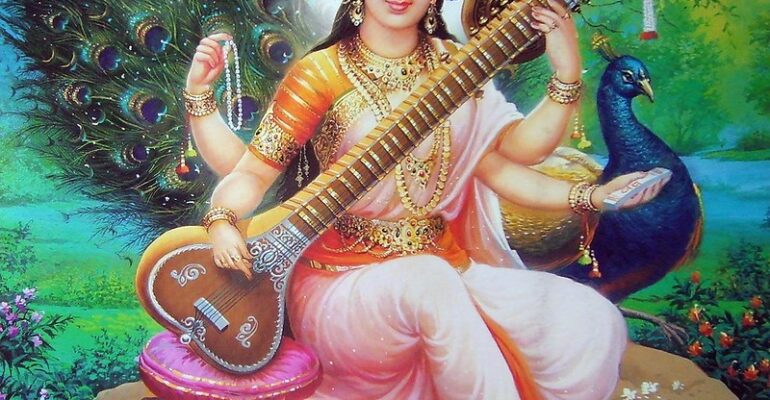An ode to the patron Goddess of Storytelling :)
My dad loves listening to talks and lectures on spirituality. He often shares little-known stories from the unending storehouse that is Indian mythology.
Recently he shared a fascinating story about Goddess Saraswati – the Hindu Goddess of Learning and Music (about whom I hadn’t heard very many stories)!
It is a little known side-story from the epic Ramayana. As we all know, Lord Rama was an avatar of Lord Vishnu, sent down on earth to vanquish and kill Ravana, the ten-headed king of Lanka.
Now here’s an interesting theory in this version of the story: When God comes down on earth as a human, apparently He forgets his true purpose! And so Rama was happy living his life in Ayodhya. He had gotten married to Sita and life was good. His father had announced that Rama would become the next King, and there was rejoicing all over.
Not in Devalok, however. The Devas were worried that if Rama became the King, and continued to rule Ayodhya, then his purpose of taking the avatar – to vanquish Ravana – would be unmet.
Notice that Ayodhya and Lanka are poles apart on the map. No possibility of a chance encounter (or a property dispute!) between Rama and Ravana here!
So they had to engineer an incident. They found the opportunity in a humble, hunchbacked maid-servant – Manthara.
Now we all know this backstory. Manthara was the servant of Kaikeyi (who was Dasharata’s third wife and Bharata’s mother). Kaikeyi actually loved Rama, and was overjoyed to hear about his coronation. But, as the story goes, Manthara “poisoned” Kaikeyi’s mind and made her demand from Dasharata the two boons that were due to her – One to make Bharata the king and two, to exile Rama to the forest for fourteen years.
Except, it’s here that we have the little-known part of the story. Apparently, Manthara was not skilled enough to convince Kaikeyi on her own. Which is where the Devas realised the need for some specialised help. They called on the best.
Goddess Saraswati.
Also known as Vak-devi (the Goddess of Speech), Saraswati is said to reside in the tongue. For a brief period, she took residence in the tongue of Manthara… which enabled her to make a compelling argument to Kaikeyi. An argument that successfully swayed her mind and got Rama exiled. An argument that ultimately led to the kidnapping of Sita from the forest. And an argument that led to the defeat of Ravana at the hands of Rama and his army of monkeys.
Basically the entire Ramayana.
Today is Mahanavami – the day when (especially) folks in South India, worship the Goddess Saraswati by keeping their books as offering.
Let us also pray to the generous Goddess of Knowledge, Learning, Music, and yes – Storytelling – to give us her continued blessings and guidance!
My dad loves listening to talks and lectures on spirituality. He often shares little-known stories from the unending storehouse that is Indian mythology.
Recently he shared a fascinating story about Goddess Saraswati – the Hindu Goddess of Learning and Music (about whom I hadn’t heard very many stories)!
It is a little known side-story from the epic Ramayana. As we all know, Lord Rama was an avatar of Lord Vishnu, sent down on earth to vanquish and kill Ravana, the ten-headed king of Lanka.
Now here’s an interesting theory in this version of the story: When God comes down on earth as a human, apparently He forgets his true purpose! And so Rama was happy living his life in Ayodhya. He had gotten married to Sita and life was good. His father had announced that Rama would become the next King, and there was rejoicing all over.
Not in Devalok, however. The Devas were worried that if Rama became the King, and continued to rule Ayodhya, then his purpose of taking the avatar – to vanquish Ravana – would be unmet.
Notice that Ayodhya and Lanka are poles apart on the map. No possibility of a chance encounter (or a property dispute!) between Rama and Ravana here!
So they had to engineer an incident. They found the opportunity in a humble, hunchbacked maid-servant – Manthara.
Now we all know this backstory. Manthara was the servant of Kaikeyi (who was Dasharata’s third wife and Bharata’s mother). Kaikeyi actually loved Rama, and was overjoyed to hear about his coronation. But, as the story goes, Manthara “poisoned” Kaikeyi’s mind and made her demand from Dasharata the two boons that were due to her – One to make Bharata the king and two, to exile Rama to the forest for fourteen years.
Except, it’s here that we have the little-known part of the story. Apparently, Manthara was not skilled enough to convince Kaikeyi on her own. Which is where the Devas realised the need for some specialised help. They called on the best.
Goddess Saraswati.
Also known as Vak-devi (the Goddess of Speech), Saraswati is said to reside in the tongue. For a brief period, she took residence in the tongue of Manthara… which enabled her to make a compelling argument to Kaikeyi. An argument that successfully swayed her mind and got Rama exiled. An argument that ultimately led to the kidnapping of Sita from the forest. And an argument that led to the defeat of Ravana at the hands of Rama and his army of monkeys.
Basically the entire Ramayana.
Today is Mahanavami – the day when (especially) folks in South India, worship the Goddess Saraswati by keeping their books as offering.
Let us also pray to the generous Goddess of Knowledge, Learning, Music, and yes – Storytelling – to give us her continued blessings and guidance!
Image credits: Saraswati Devi by drakoheart on Flickr







